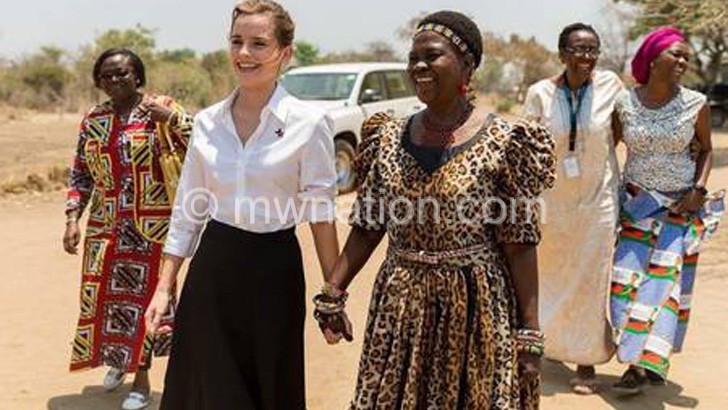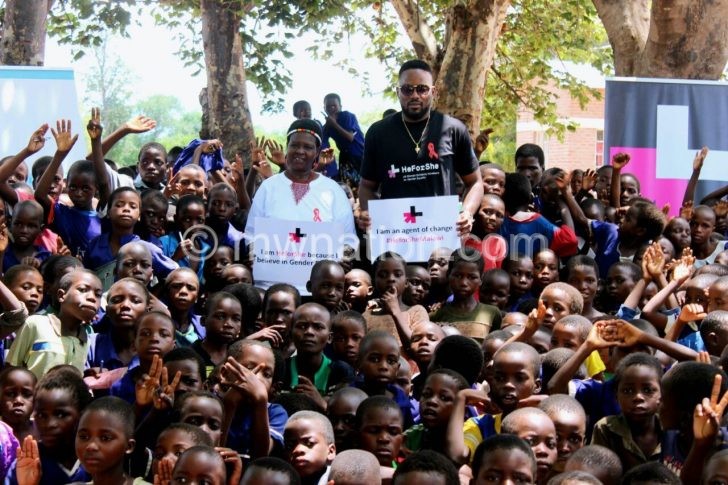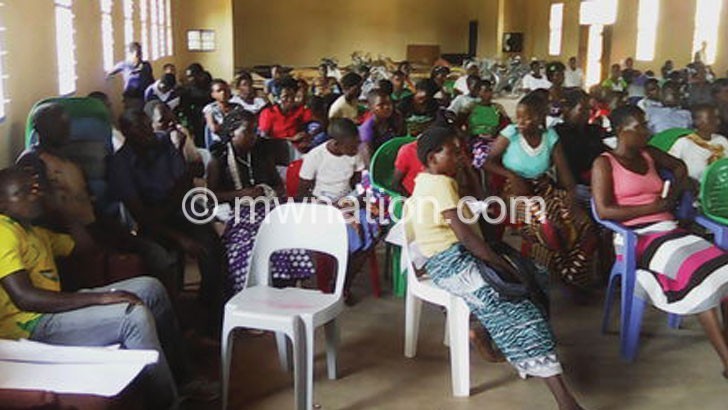‘Save us from child marriages’
In this third and final part, our reporter BOBBY KABANGO highlights efforts government and non-governmental organisations are making to end child marriages in the country.
Globally, one girl under the age of 15 is married every seven seconds, according to a recent report by Save the Children.

The study says girls as young as 10 are forced to marry much older men.
The report says early marriage can trigger a cycle of disadvantages across every part of a girl’s life.
Conflict, poverty and humanitarian crises are seen as major factors that leave girls exposed to child marriage.
In Traditional Authority Chilipa’s area in Mangochi poverty is the main driver of child marriages.
At Chilipa Community Day Secondary School which has more male students than females, one girl, Eranivy Malefula, says their hope to be saved from the social problem lies in government and non-governmental organisations’ interventions.

Eranivy, 19, is a child raising a child. She was once married off to an older man when she was just 16. Today, she has to raise a two-year-old baby alone.
“I dropped out of school for marriage when I was 16. I thought it would be a joyful moment in our family, little did I know it would turn into hell.
“I was sleeping with a 37-year-old man who had another wife with two children. It was traumatic and something I never imagined would happen to me,” says the Form Two student, who has since returned to school and wants to be a chartered accountant.
However, Eranivy says she is the odd one out as many girls in her village are still stuck and need help to get out of marriages.
“Government must save girls from child marriages in this area. In my village, I am the only girl out of 20 who is back in school and I plead with government to help. Girls are suffering, the york of marriage is too heavy for 16-year-olds,” she says.

Echoing Eranivy’s sentiments, head teacher at the school, Richard Tomoka said most of the girls in Chilipa prefer marriage to education.
“We have had situations here that only a single girl completes Form Four out of 60 students. It’s a terrible situation,” decries Tomoka.
National efforts
The battle to end child marriages has been hard and slow due to harmful cultural practices that fuel the problem.
Desperate, in 2015, Malawi passed the Marriage, Divorce and Family Relations Act, which raised the minimum age of marriage to 18. United Nations arm, UN Women, together with international organizations (INGOs) and partners, played an integral role in advocating for the new law and works with traditional chiefs to change some of the local practices.
President Peter Mutharika too joined forces by being a He for She Impact Champion.
Mutharika set ambitious goals to fully implement the new marriage law within five years and appointed a special task force to wage war against child marriages.
Traditional leaders—especially Chief Kachindamoto of Dedza, has been a formidable force in the war. In fact, she has been nicknamed “The Terminator” of child marrages.
“My goal is to ensure that girls go back to school and end some harmful practices,” she tells Weekend Nation.
Kachindamoto and fellow chiefs have implemented the annulment of over 1 500 child marriages and restored the futures of the girls.
But the progress is not possible without investing in women and girls.
That is why according to UN Women, Malawi has to double investing in women if the Sustainable Development Goals (SDGs) are to be achieved.
“We want a Planet 50-50 by 2030 and we need to step it up for gender equality. This is why UN Women in Malawi has made ending child marriage a top priority for change,” a statement from UN Women notes.
Local efforts to end child marriages have attracted international attention with superstars such as Emma Watson visiting Malawi to see how the battle is being waged.
Involvement of local mothers’ groups, is also paying dividends. The mothers’ groups are helping to counsel girls and reduce discrimination against young mothers in schools, which can otherwise derail their attempts to continue education.
These efforts give hope to parents in Chilipa such as Flyton Kampiru of Jekete village who says these interventions must reach her area because most parents still think it is normal to marry off a child when they reach puberty.
“It is a tradition here that girls do not go far with school. We have by-laws but they are not working,” she laments.
Not all is lost
But not all is lost in Chilipa. On one hand, The Icelandic International Development Agency (Iceida) has been working in the district since 1989 fighting against child marriages.
Icelandic programme director Dr. Gudmundur Runar Arnason expresses concern that despite their efforts early marriages are still rampant.
“We have been working in Mangochi since 1989 because we noted the problem. It is completely unacceptable. This has to end,” says Arnason.
The Icelanders have since signed a four-year cooperation agreement between Mangochi District Council to scale up the interventions.
“Our programmes will emphasise the importance of education and the postponement of marriage and parenthood. We believe that Chief Kachindamoto has developed an important model that can be built upon and we intend to facilitate her Back-to-School programme in Mangochi,” he said.
While United Nations Childrens Fund in Malawi chief of communication Andrew Brown said child marriage is an important issue in Malawi that has to be tackled at all costs.
He says Unicef’s work on this issue is focused around changing policy, such as the recent change in the Constitution to set the minimum age at 18, changing attitudes and behaviour, and supporting girls affected by child marriage.
“Uncef in collaboration with Plan International and Ujamaa Pamodzi, has introduced ‘Reflect Action Circles’ targeting girls who had dropped out of school because of child marriage.
“In these circles, community members reflect on the causes of the problem and likely results, and come up with a plan on how to overcome and deal with such issues. As a result, community groups have been formed that conduct door-to-door visits to households to alert them on child rights,” explains Brown.
On the part of government, director of Child Affairs in the Ministry of Gender, Children, Social Welfare and Disability Mcknight Kalanda said the ministry has formed structures in every district including Mangochi to ensure that children are being sent back to school.
“We have a national task force on ending child marriages; this group is ensuring that girls who were married off go back to school.
Unless these efforts are well funded and enforced, girls in Chilipa will keep on dropping out of school.
As Desmond Tutu and Graca Machel once said Child marriage happens because adults believe they have the right to impose marriage upon a child.





